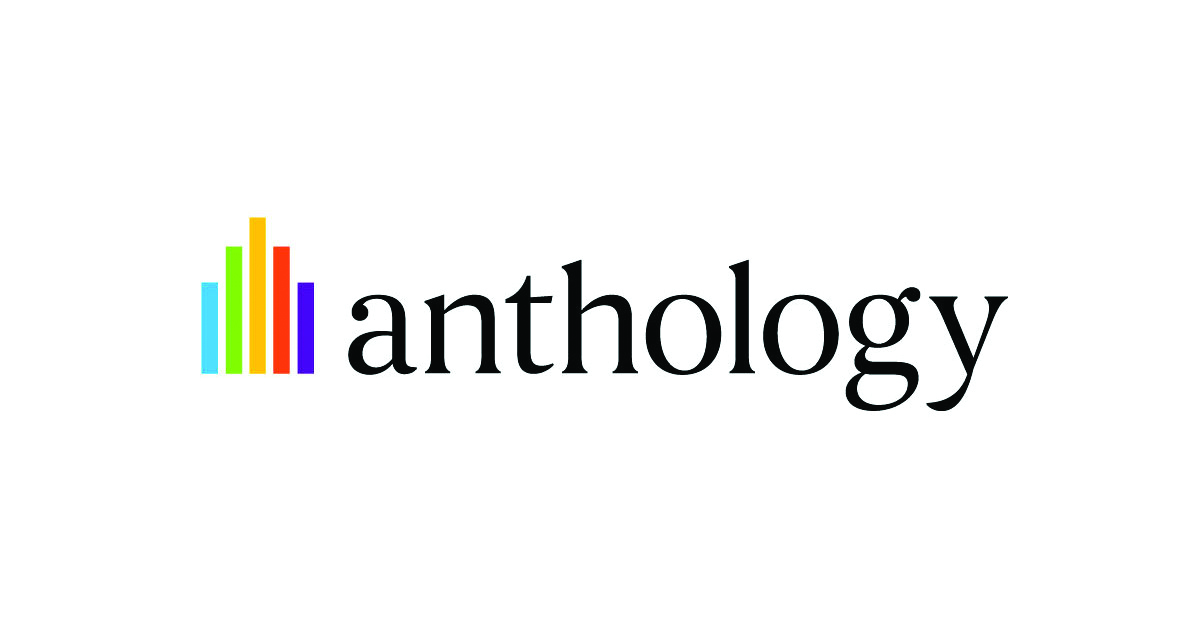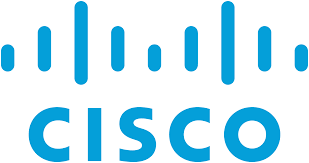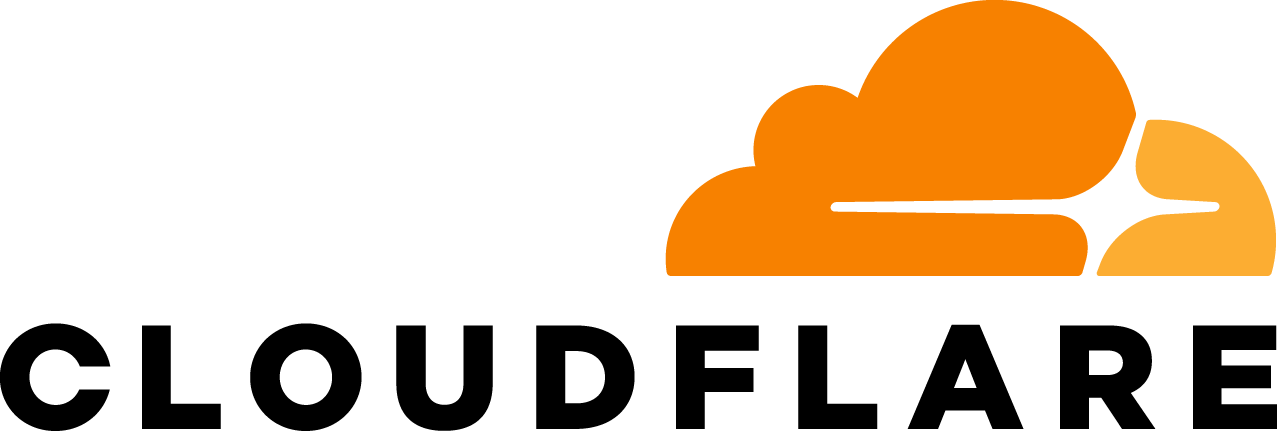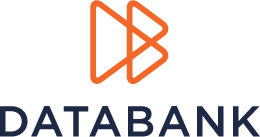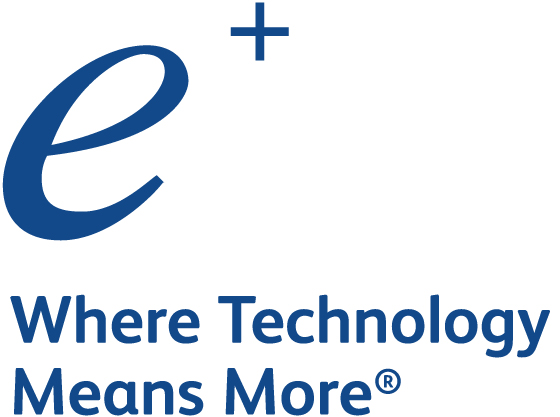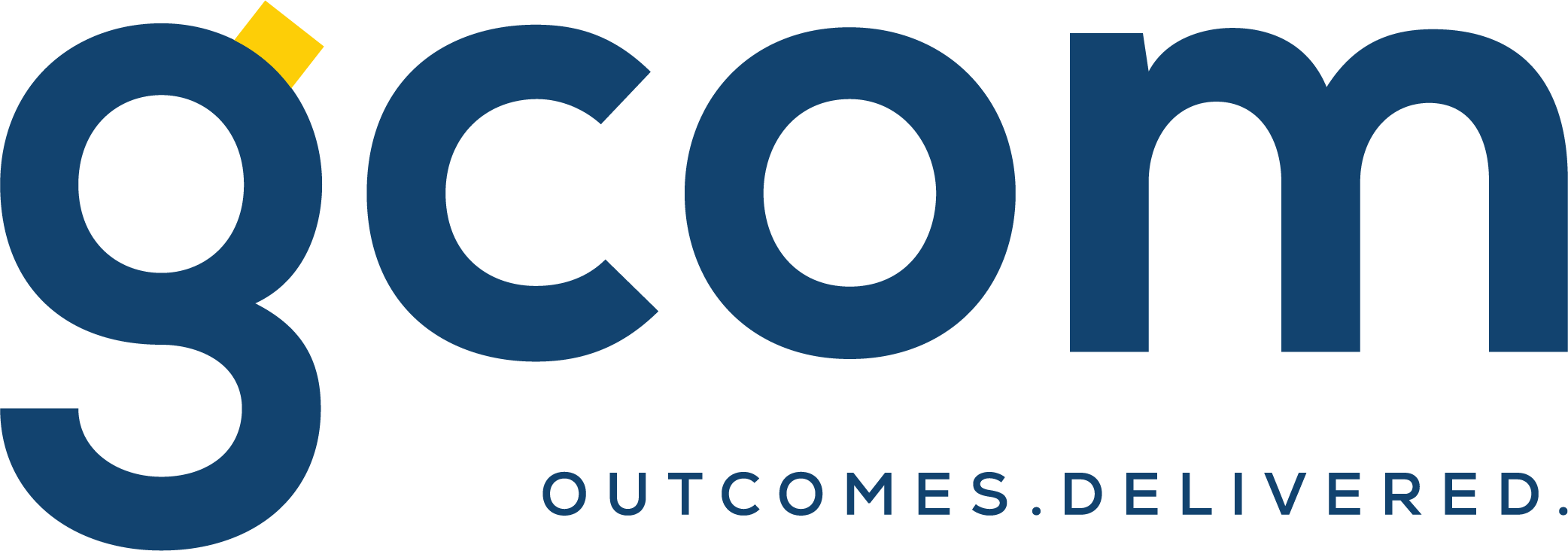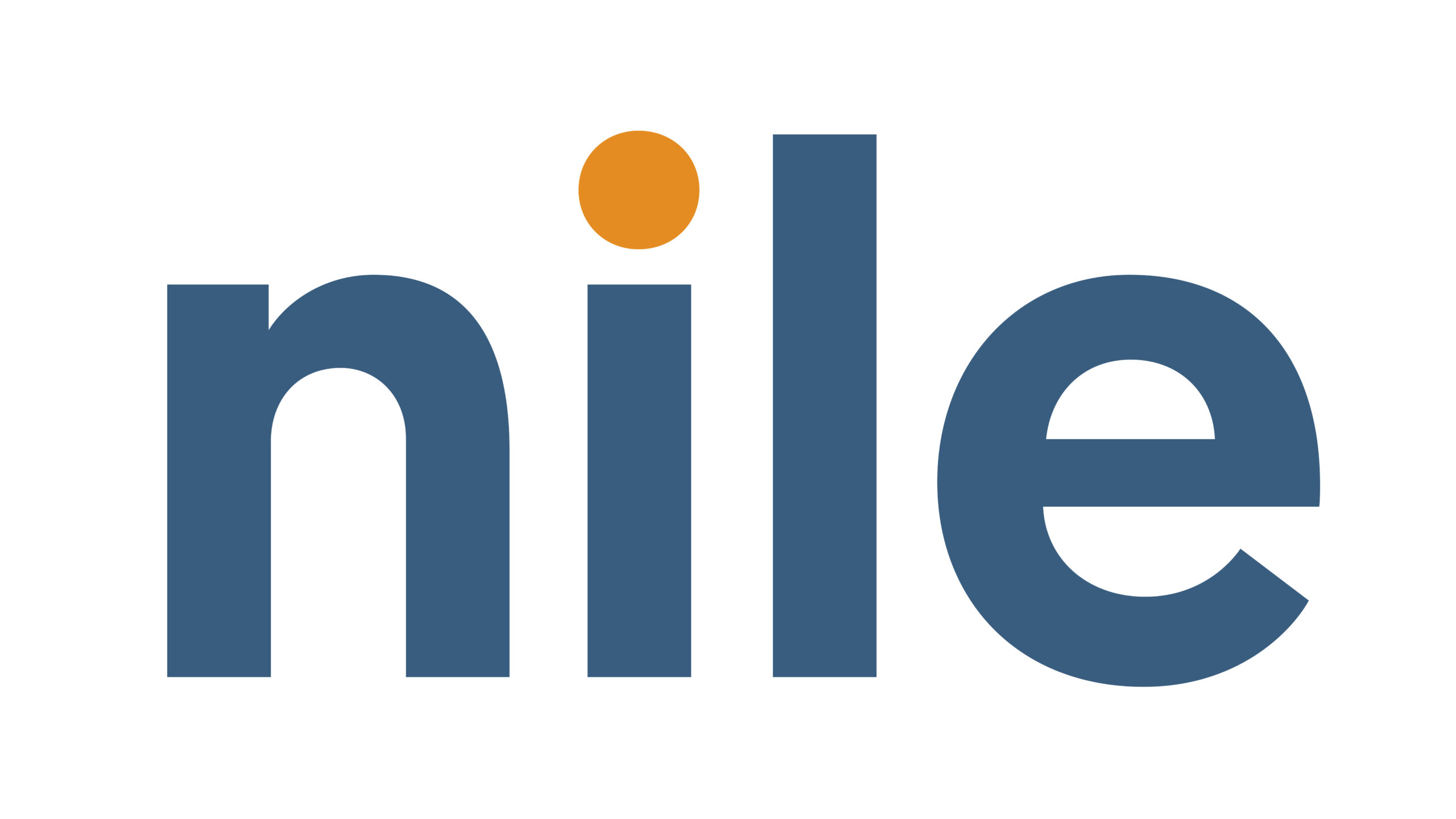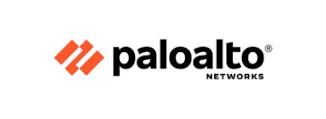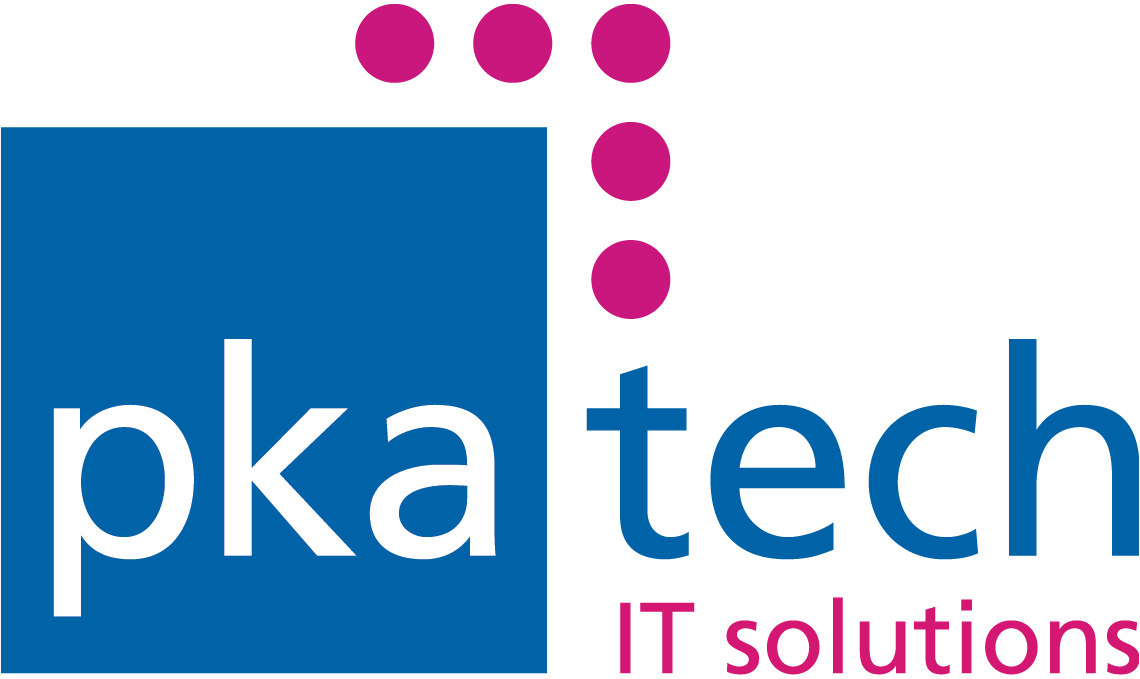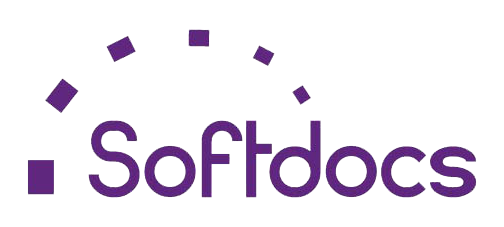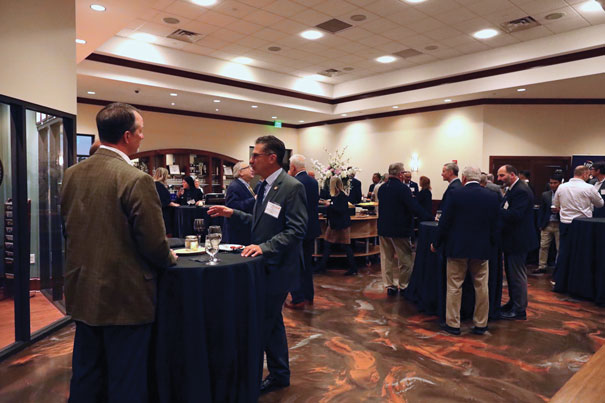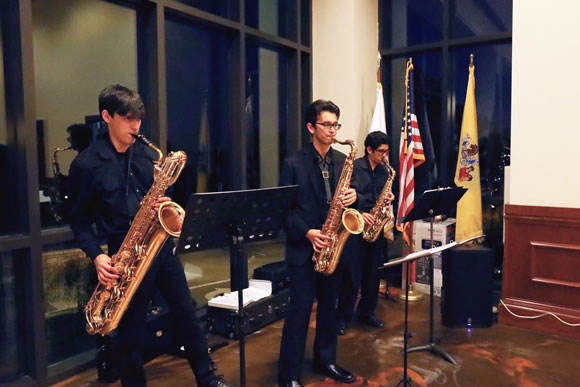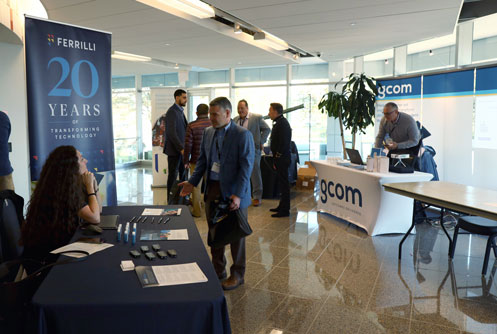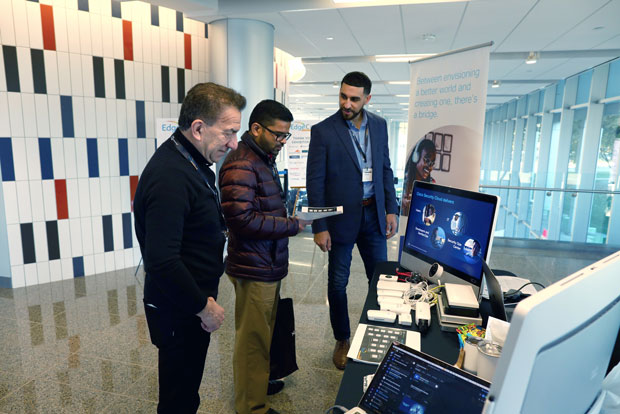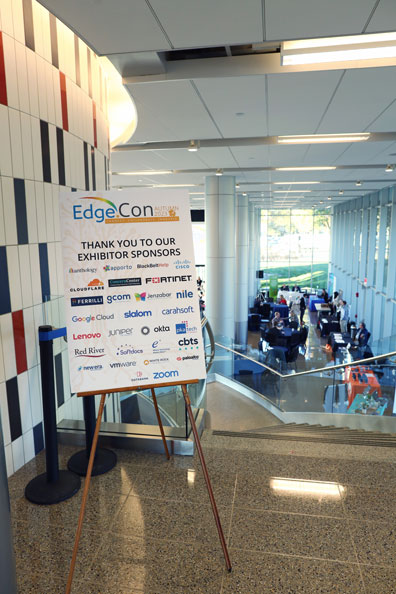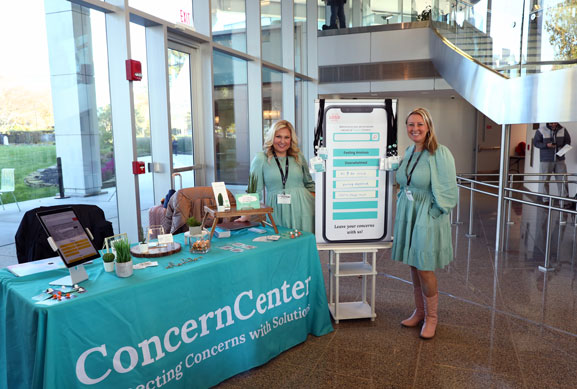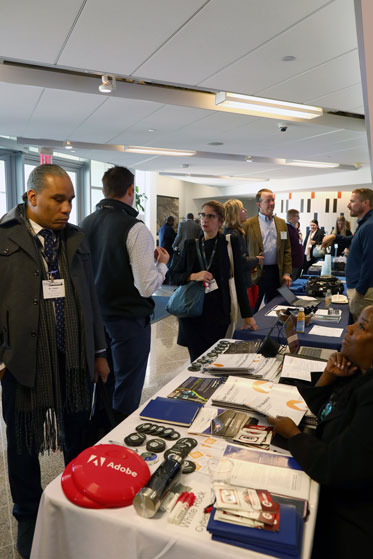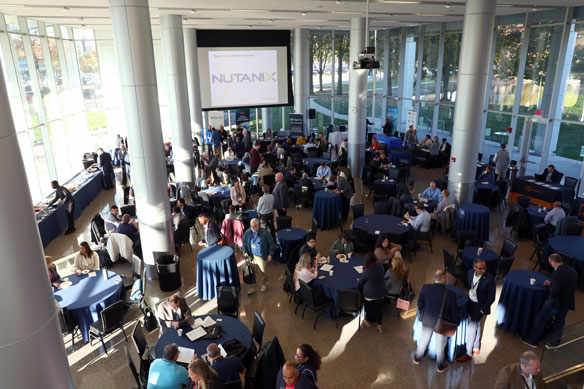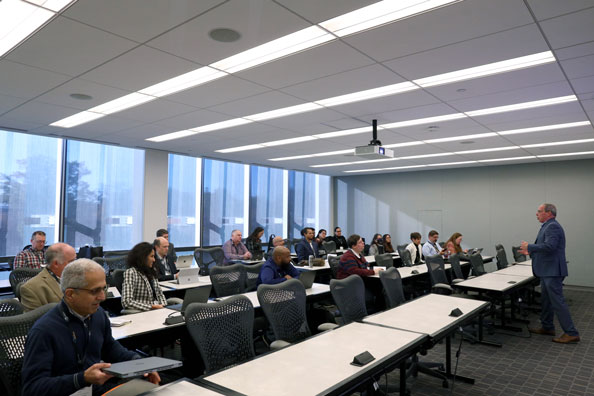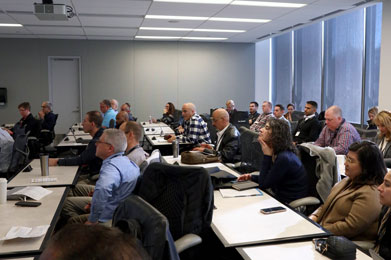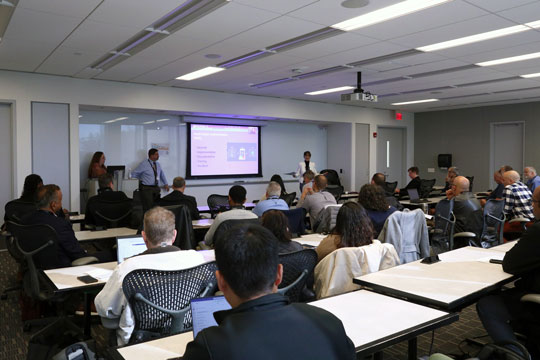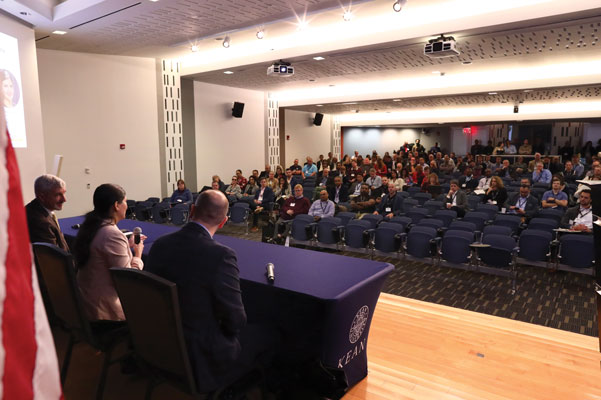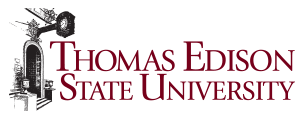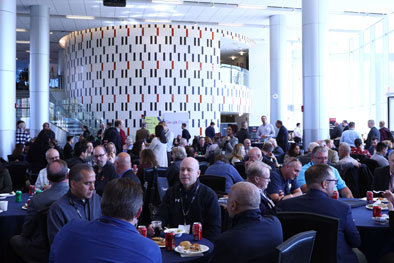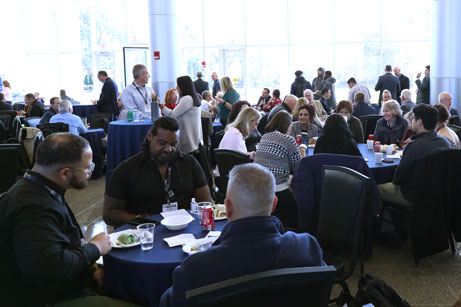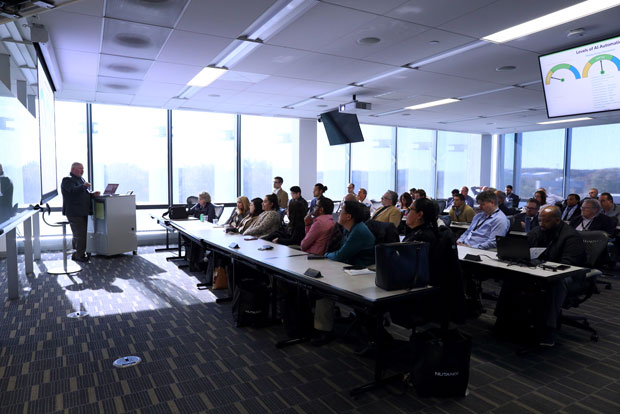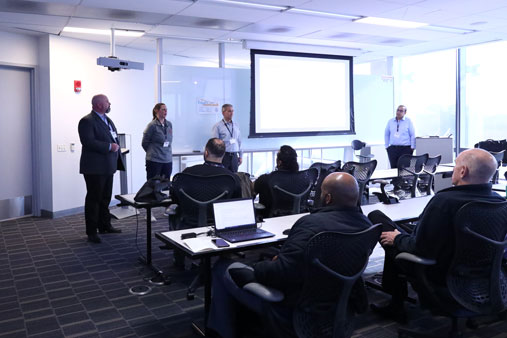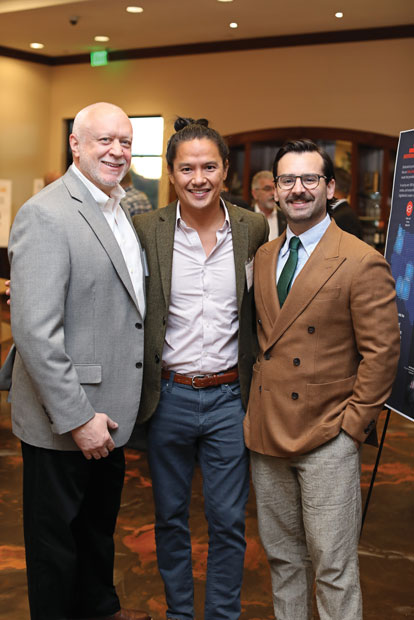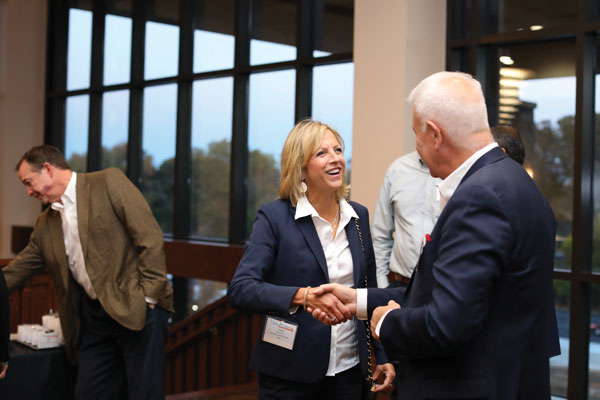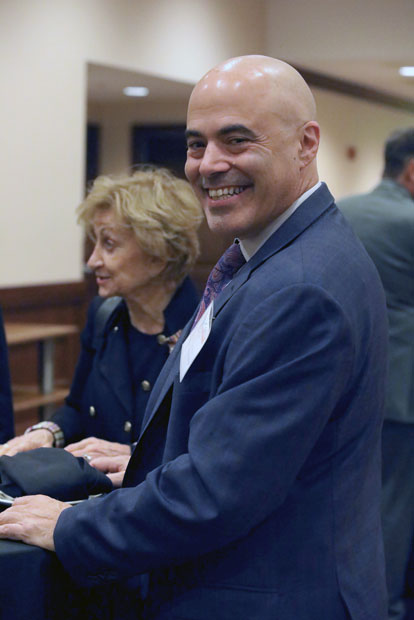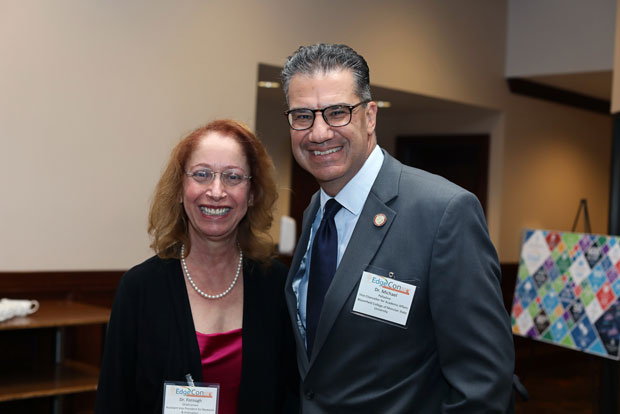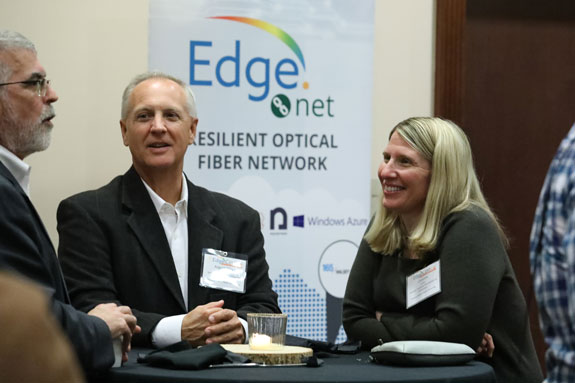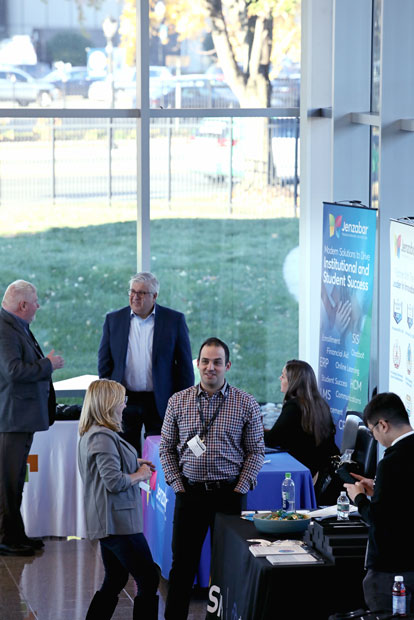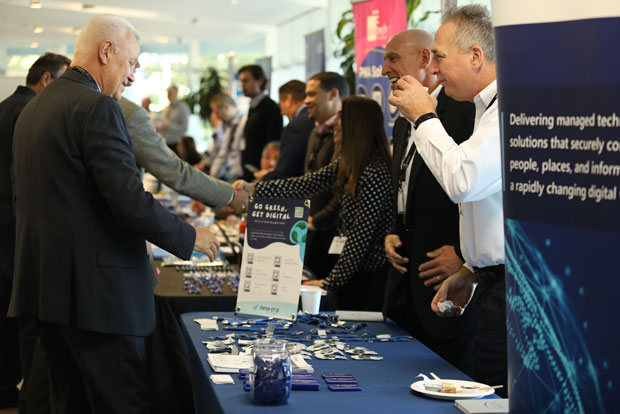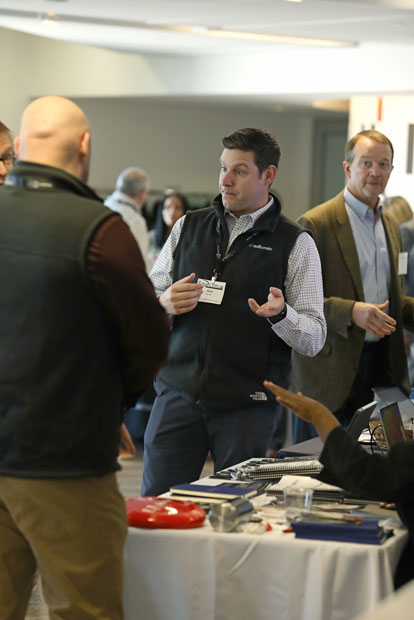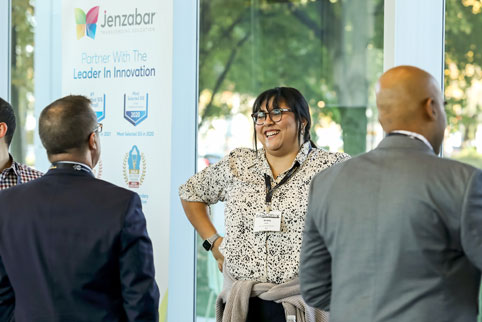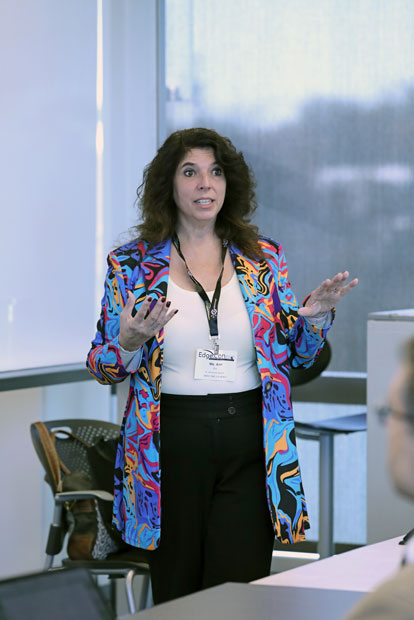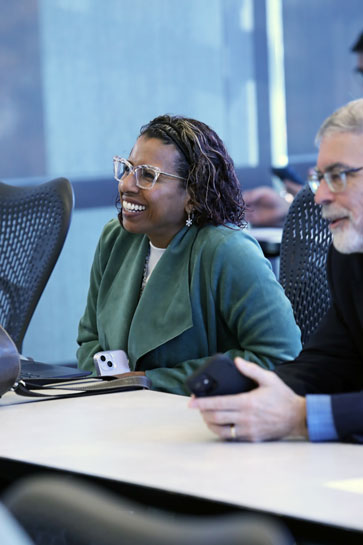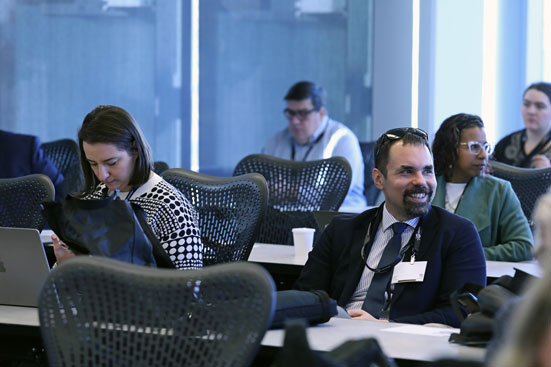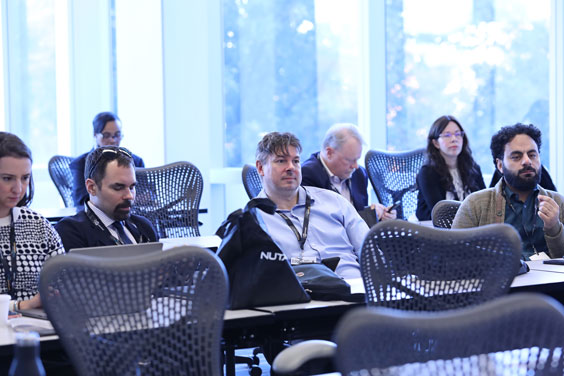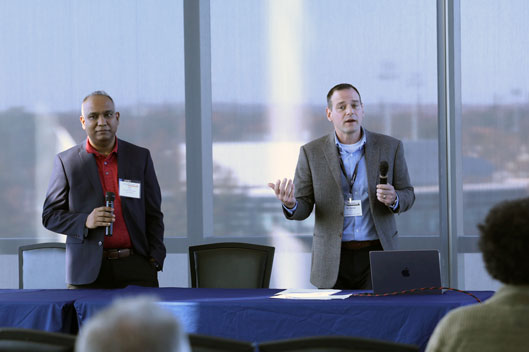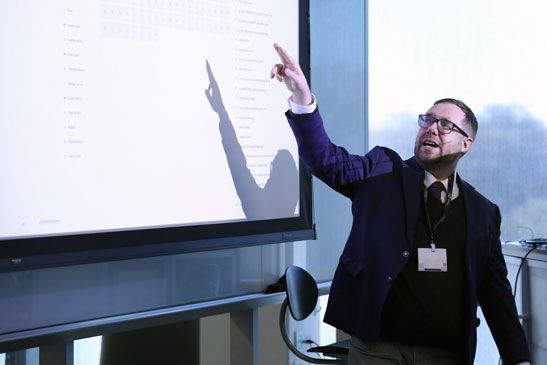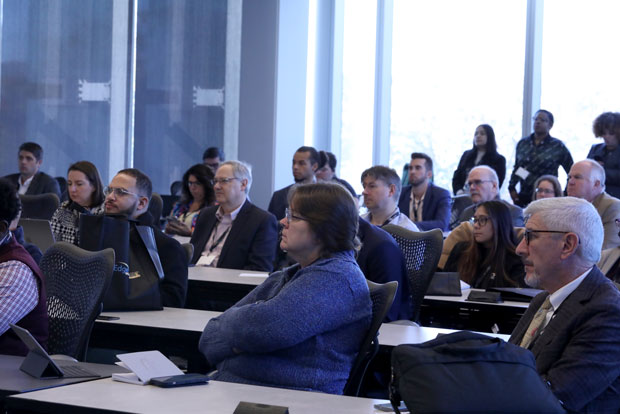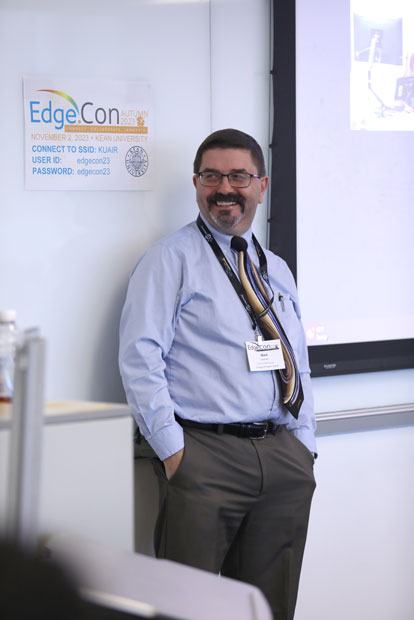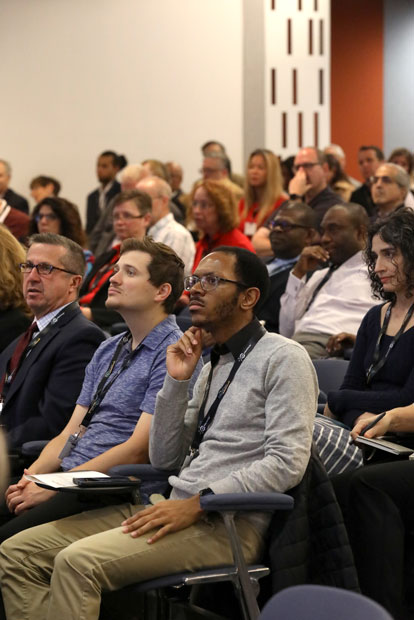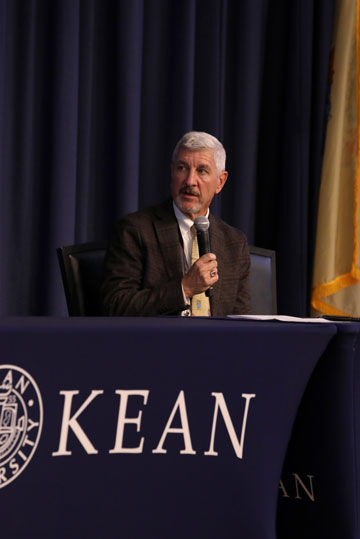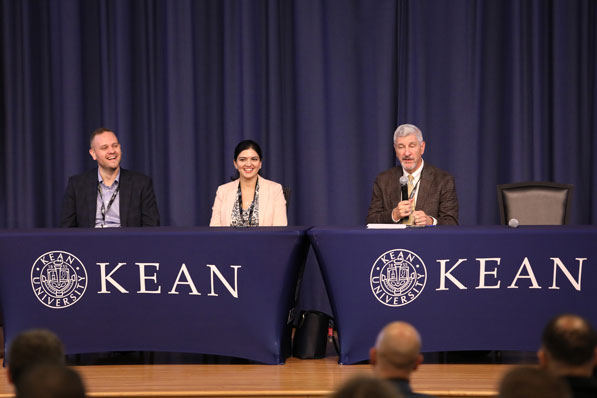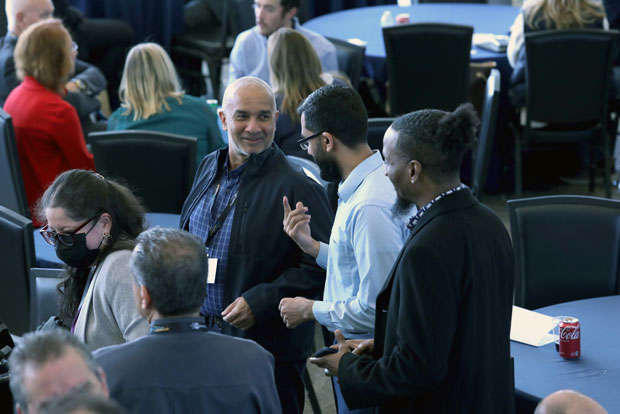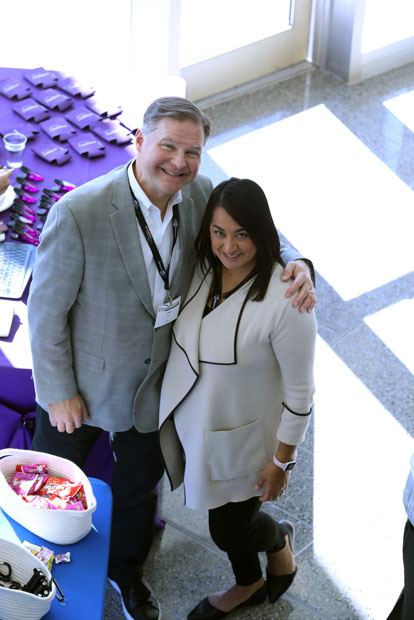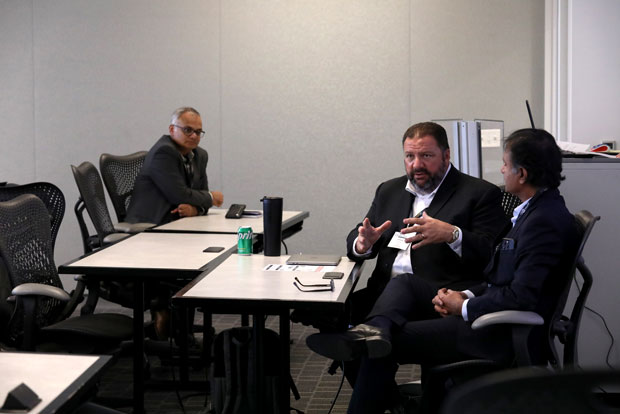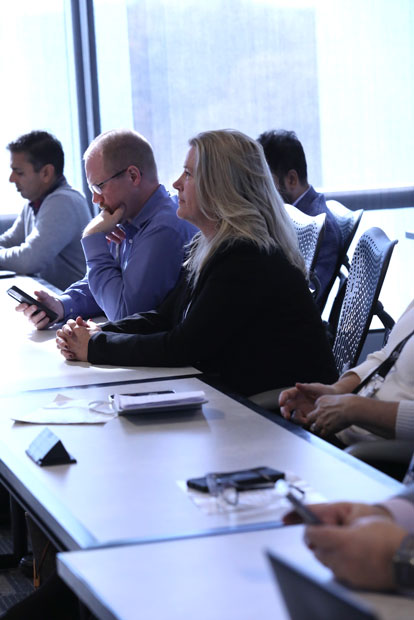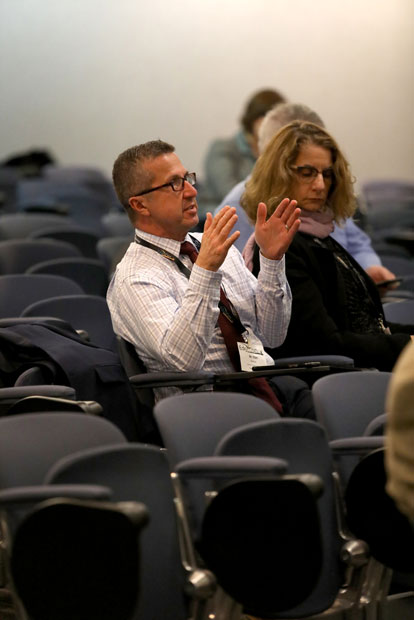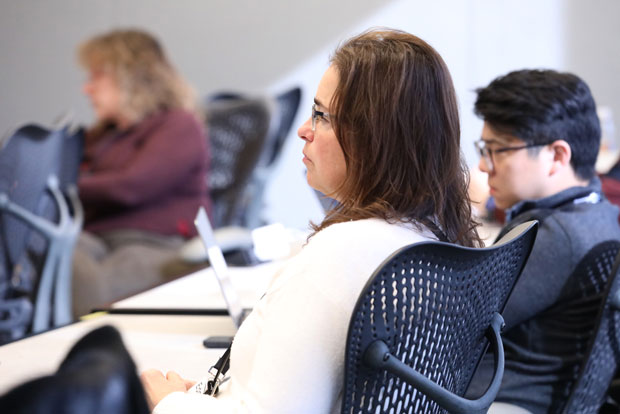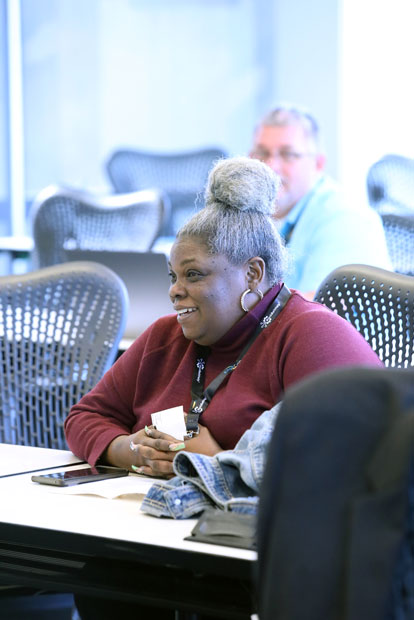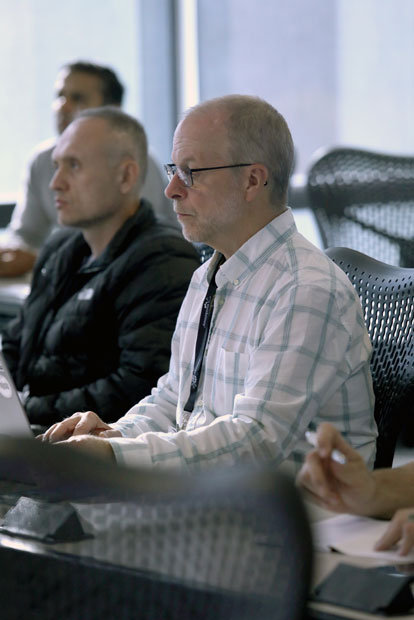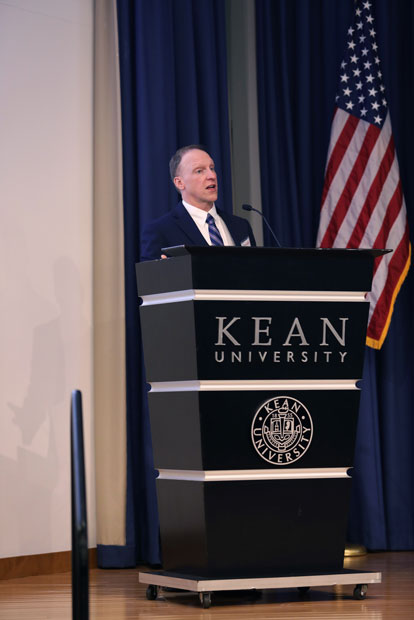
Reimagining How Technology Can Transform Your Institution
Hosted in partnership with Kean University, EdgeCon Autumn brought together attendees from around the region to explore how technology can transform their institution and accelerate important initiatives involving cybersecurity, campus networks, cloud strategy, and student support applications. Held on November 2 at Kean University, EdgeCon Autumn provided a panel discussion and a full agenda of breakout sessions allowing participants to dive deeper into a variety of topics. With 93% of attendees rating the event 4-5 stars (with 5 being the top end of the scale), this premier event also provided an opportunity for members of the higher education technology community to connect, share valuable insight, and build relationships with industry leading vendors who support technology transformation across the institution.
Balancing Innovation and Risk
To kick off the conference’s exciting day of events, attendees were invited to a panel discussion, Balancing Innovation and Risk Through the Process of Digital Transformation, led by David Sherry, Chief Information Security Officer, Princeton University and Ed Wozencroft, Vice President for Digital Strategy and Chief Information Officer, New Jersey Institute of Technology. This presentation provided college and university leaders with a unique perspective on balancing innovation and risk through an accelerated period of digital transformation.
Especially as technology increasingly integrates with every facet of higher education, many organizations are concerned about compliance, data privacy, and the performance and financial health of their institution. The discussion emphasized ways that leaders across an organization can participate in a cultural shift to take advantage of new tools such as AI, data analytics, and innovative SaaS applications, while responsibly managing institutional risk through strategic planning and collaboration. Participants were able to explore how effective planning and collaboration can mitigate risk and ways to identify areas on their campus where digital transformation can produce positive change.
How to Fail Innovation
In today’s academic landscape, universities expect their Information Technology (IT) Departments to be hubs of innovation. The breakout session, How to Fail Innovation 101, aimed to redefine innovation and highlight its potential within IT departments. Dr. Robert Clougherty, CIO, Drew University, discussed the motivations for innovation, common missteps, and how to develop operational strategies that foster, not stifle, innovation. Exploring how a positive environment for innovation can be beneficial to an entire IT team, Dr. Clougherty delved into various theories of innovation and how to implement these advancements effectively, while also addressing potential pitfalls and challenges.
Successful Online and Hybrid Course Development
Instructional Designers, Ann Oro, Lisa Bond, and Kate Sierra, from Seton Hall University led the breakout session, Creating a Path for Faculty Success in Online and Hybrid Course Development, where they explored course design, objectives and alignment, student engagement strategies, accessibility, and ideas for assessment and feedback using the University’s chosen quality assurance rubric as the foundation. This interactive session shared best practices in creating and delivering an online course and ideas for creating engaging lectures and using the learning management system and templates.
High Performance Computing
In a world where massive amounts of data are being created and collected every single second, turning that data into insight requires continuous dedication to innovative ways in deciphering large amounts of data and transforming it into wisdom. Breakout session, High Performance Computing – Value Proposition in Research, presented by Paul Attallah, National Account Manager, DataBank, discussed how High Performance Computing (HPC) is the foundation for scientific, industrial, and societal advancements and how this technology will be essential in helping transform data into human advancement and progression.
Starting Your Zero Trust Journey
As cybersecurity challenges continue to grow, the Zero Trust security model has become well established in the industry to help secure organizations and improve cyberthreat defense. John Bruggeman, Consulting CISO, CBTS, led the breakout session, Find Out Where to Start Your Zero Trust Journey, to help answer the question, How do you know where to start your Zero Trust journey? Attendees learned how using a Zero Trust readiness assessment can show an institution what parts of the people, process, and technology triad they already have in place, what gaps exist, and how to create a scalable security model that protects all data, systems, and networks.
Leveraging CX Solutions
Presenters Manish Wadhwa, Associate Provost Academic Applications & Technology, Fairleigh Dickinson University, and Anthony Humphreys, President, BlackBeltHelp, led the breakout session, Leveraging CX Solutions to Enhance the Student Experience, Boost Enrollment, and Increase Retention, to discuss how to empower higher education institutions to unify their applications into a simple yet powerful, analytics-driven, centralized hub for students, faculty, and staff. Users can then access a wide range of services, including technical assistance and support services for Admissions, Records, Registration, Financial Aid, Bursar’s Office, and Accounts Receivable all conveniently located in a single platform. The discussion also included recent examples and case studies of how to use conversation-driven AI-powered bots for natural, personalized customer assistance, and how this technology can provide always available, immediate service.
AI and the Evolution of Strategic Planning and Assessment
Merging theoretical discourse with practical demonstrations, this breakout session explored the nascent role of AI in higher education. Centenary University’s Director of Institutional Research and Assessment, Viktoria Popova, discussed GPT-4.0 and its potential for transforming the strategic planning process, the use of AI in designing new strategic planning objectives, and embedding sustainable but agile strategic planning assessments in existent initiatives. Popova also shared socio-cultural implications of integrating AI into higher education, highlighting its powerful “reasoning” capabilities, while acknowledging its limitations and potential risks. In this session, attendees also learned about the vital role of human responsibility in the effective use of AI. Particularly with a focus on our own unique abilities in language mastery and logical reasoning, which when synergized with AI, enable us to attain achievements beyond what AI could reach on its own.
Using Chatbots in the Online Learning Experience
Chatbots can help improve the online learning experience by assisting users navigating library websites in search of information. Michelle Ehrenpreis, Electronic Resources Librarian/Assistant Professor, Lehman College, and John DeLooper, Web Services-Online Learning Librarian/Assistant Professor, Lehman College, led the discussion, Using Chatbots to Improve the Online Learning Experience. The presentation shared details of a current project that is conducting a content analysis of questions posed to the Lehman Library’s chatbot, which uses the ChatGPT AI. Attendees learned about the chatbot’s weakness, how the information gleaned from the analysis may improve the library website, and how projects using artificial intelligence, like chatbots, can lead to better online learning experience for library users.
Modernizing the ECM and SharePoint
George Sotirion, CIO, Brookdale Community College, and Moe Rahman, CIO, Rider University, led the breakout session, Modernizing the ECM and SharePoint: Simplifying Services and Collaboration through Digital Transformation. This presentation explored Brookdale’s Digital Transformation Initiative that began in 2022 with the modernization of the enterprise content management system including eForm integration and advanced workflows. Throughout the session, presenters discussed the initiative from the planning to execution phases and the important role of involving stakeholders during the entire process.
Technology Initiatives Utilizing Limited Resources
Patricia Kahn, CIO, Mark Lewental, Director, and Doriann Pieve-Hyland, Director, from the College of Staten Island (CSI) led a breakout session, Technology Initiatives Utilizing Limited Resources that Adapt to a Changing World. Participants learned how CSI implemented hyflex technology to migrate CSI’s on prem email system to M365 and provided technology and training support, all on a limited budget. Attendees enjoyed a live demonstration of the hyflex technology and explored the M365 rollout strategy, communication plan, experiences, lessons learned, and future initiatives.
Modernizing and Enhancing Analytics Infrastructure
Rob Stirton, VP of Institutional Effectiveness and CIO at County College of Morris (CCM) joined John Van Weeren, VP Higher Education, GCOM Software, to demonstrate how CCM uses insights from their analytics platform for real-time decision making across the institution. This solution leveraged their existing business intelligence software investment and dramatically improved the availability and accuracy of information through visual analytics for all audiences, while significantly reducing workload on IT and researchers.
Attendees also learned about CCM modernizing in the Cloud with GCOM’s SSA Cloud platform and how it increases access and usability, reduces management costs, while seamlessly integrating data sources with hybrid cloud architecture. With the move to the Cloud, CCM shared how they are better equipped to adapt to changing technical business needs, while allowing them to leverage built-in capabilities, such as machine learning models that identify admissions and financial aid fraud.
Building Data Analytics Centers
The afternoon breakout session, Building Data Analytics Centers for Colleges & Departments, led by Rowan University’s Alex Luu, MS-ITM, Data Analyst, Benjamin Hyman, Senior Data Analyst, and Carlos Mercado, Senior Data Analyst, shared valuable insight into building successful data centers. Attendees learned how the team at Rowan used Extract, Transform, & Load process to build complex and common datasets, predictive models, visualizations, dashboards, and reports based on these data sets and models, and packages them into different data centers.
Automating Identity and Access Management
Jeremy Livingston, Chief Information Security Officer, Rafat Azad, Security Engineer, and Kristen Conti, Identity Systems Administrator, from Stevens Institute of Technology led the session, Automating Identity and Access Management, which outlined how the institution used Okta to automate onboarding and account creation processes and set up automatic deprovisioning of accounts and licenses for employees and graduating students. Presenters also shared how the organization was able to enhance security and provide opportunities for further community engagement with alumni portal access. Attendees also saw how the institution saved money and time with automated license management for key applications and reduced workload/overhead.
Ransomware Preparation and Security Success
David Sherry, Chief Information Security Officer at Princeton University, led the session, How Important Is Culture to Security Success?, to explore how the challenges of budgets, staffing, and external threats can hinder enterprise success and how to create a culture of security within your own institution.
Later in the afternoon, the breakout session, Collaboration Among Academia, Local and Federal Law Enforcement, Professionals in Ransomware Preparation, explained how a community approach is required to effectively prepare for a potential ransomware event. Presenter, Stan Mierzwa, Center for Cybersecurity, Kean University, discussed the crucial preparation, response, and recovery tasks and categories associated with ransomware to serve cross disciplines and the role ethics can contribute in contending with ransomware. Participants also reviewed a harmonizing ransomware incident response checklist that can be used to help guide organizations with the varied categories of tasks associated with ransomware recovery.
Data Management Trends and Tools
Melissa Handa, Program Director, IEEE, and Forough Ghahramani, Associate Vice President for Research, Innovation, and Sponsored Programs, Edge, joined together to present Data Management Trends and Tools for Discovery and Open Science where they reviewed the challenges and opportunities associated with research data management. Attendees learned about the fundamental requirements for a unified data and collaboration platform which researchers can leverage to efficiently store, share, access, and manage research data, accelerating institutional research efforts. The session also explored the features of the IEEE Dataport platform, an easy-to-use, globally accessible data management platform.
Improve Monitoring Effectiveness
For many institutions, the effectiveness of leveraging monitoring tools is not aligned with the organization’s service improvement goals. Joseph Karam, Director, Enterprise Monitoring Services, Princeton University, discussed this topic in the breakout session, Establishing Procedures to Improve Monitoring Effectiveness. For the past two years, Princeton has been implementing improved monitoring strategies for the entire IT organization that have identified gaps in monitoring areas and allowed them to consolidate tools to improve how monitoring is used. The session provided an overview of the University’s monitoring services and the strategies that have been implemented to provide improved IT services to the Princeton community.
EdgeCon Autumn General Session
Balancing Innovation and Risk Through the Process of Digital Transformation
This panel discussion provided college and university leaders with a unique perspective on balancing innovation and risk through an accelerated period of digital transformation. As technology increasingly integrates with every facet of higher education, concerns about compliance, data privacy, and the performance and financial health of institutions are paramount in the strategic decision making process. The discussion emphasized ways that leaders across the university can participate in a cultural shift to take advantage of new tools such as AI, data analytics, and innovative SaaS applications, while responsibly managing institutional risk through strategic planning and collaboration.
The panel discussion explored:
- How institutional culture must evolve to support innovation and digital transformation
- How effective planning and collaboration can mitigate risk
- How to identify areas on campus where digital transformation can produce positive change
Panelists:

David Sherry
Chief Information Security Officer
Princeton University
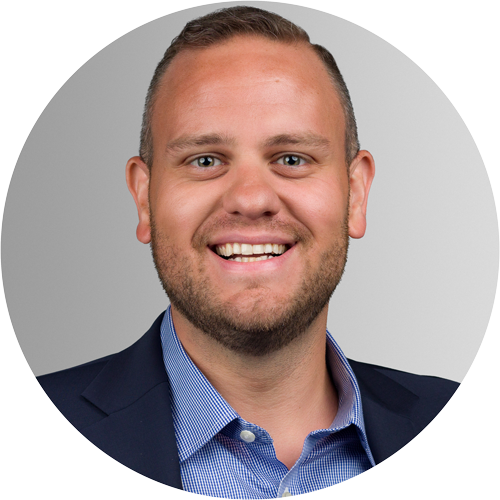
Ed Wozencroft
Vice President for Digital Strategy and Chief Information Officer
New Jersey Institute of Technology
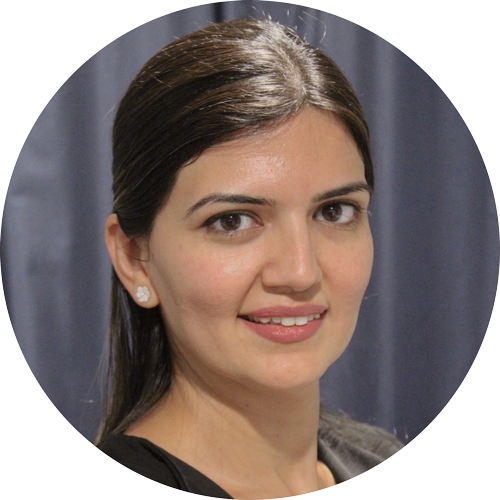
Maryam Mirza
Senior Director IT,
Client Experiences and
Strategic Initiatives
Stevens Institute of Technology
EdgeCon Autumn 2023 Agenda
8:00-8:30 am – Check-In & Networking
8:30-9:15 am — Welcome, Breakfast, & Exhibitor Connections
9:20-10:00 am — Breakout Sessions
10:10-10:50 am — Breakout Sessions
11:00 am-12:00 pm — EdgeCon Panel Discussion: Balancing Innovation and Risk Through the Process of Digital Transformation
12:00-1:00 pm — Lunch, Networking, & Exhibitor Connections
1:10-1:50 pm — Breakout Sessions
2:00-2:40 pm—Breakout Sessions
2:50-3:30 pm—Breakout Sessions
3:30-4:30 pm—Snacks/Coffee, Networking, & Exhibitor Connections
9:20 – 10:00 am – Breakout Session 1
How to Fail Innovation 101
In today’s academic landscape, universities expect their Information Technology (IT) Departments to be hubs of innovation. However, the prevalent understanding of ‘innovation’ often leans towards adopting market trends rather than being truly forward-looking. Unfortunately, these ‘innovations’ are often external, sourced from third-party software, rather than emerging from the IT team’s internal processes and practices.
This presentation aims to redefine innovation and highlight its potential within IT departments. We will explore the motivations for innovation, common missteps, and how to develop operational strategies that foster, not stifle, innovation.
A positive environment for innovation can benefit the entire IT team. It encourages employees to develop more effective processes and practices, and empowers IT leadership to create an environment that nurtures innovation or remove existing barriers to it.
We will delve into various theories of innovation, drawing analogies from a range of domains including rainforests, gardens, machines, and even Plato’s Divine Frenzy. The presentation underscores the unique pressures on IT departments to innovate, making a clear distinction between innovation and invention.
Innovation, according to our perspective, isn’t just about creating something new—an act of invention—but about altering product, process, or practice life cycles to enhance efficiency, effectiveness, and advantage. We will provide insights on implementing innovation effectively, while also addressing potential pitfalls and challenges.
Presenter:
Dr. Robert Clougherty, CIO, Drew University
Creating a Path for Faculty Success in Online and Hybrid Course Development
When our first Online Teaching Certificate debuted in 2017, it was a five-session series offered in person. Over time, we added a second five-session level two and transitioned to a hybrid, then fully asynchronous experience. Both levels are suitable for both new and experienced professors who want to transition to online teaching or enhance their existing skills. Using the University’s chosen quality assurance rubric as the foundation, we cover a wide range of topics, including course design, objectives and alignment, student engagement strategies, accessibility, and ideas for assessment and feedback. Our course is designed to be practical, interactive, and engaging, providing best practices in creating and delivering an online course. Level two expands on the quality assurance rubric and introduces the Transparency in Learning and Teaching process, creating engaging lectures, and utilizing the learning management system and templates. Faculty leave both levels with completed materials to use in their own online or hybrid course.
Presenters:
Ann Oro, Senior Instructional Designer, Seton Hall University
Lisa Bond, Instructional Designer, Seton Hall University
Kate Sierra, Instructional Designer, Seton Hall University
High Performance Computing – Value Proposition in Research
Given all the data that is being created worldwide every single second, the frontier of Data Science, driven by the quest of knowledge management, will require continuous dedication to innovative ways in deciphering large amounts of data and transforming it into wisdom; thereby, aiding in human advancement and progression.
High Performance Computing (HPC) is the answer. HPC is the foundation for scientific, industrial, and societal advancements.
Presenters:
Paul Attallah, National Account Manager, DataBank
Find Out Where to Start Your Zero Trust Journey
How do you know where to start your Zero Trust journey? Do you have all the parts of Zero Trust in place to control risk to your crown jewels? If you don’t know where to start, you probably need to assess your situation. Using a Zero Trust readiness assessment you can see what parts of the people, process, and technology triad you already have in place and what you don’t. With a readiness assessment you can figure out what to focus on first in order to tackle the remaining parts of the Zero Trust jigsaw.
Presenters:
John Bruggeman, Consulting CISO, CBTS
Bradley Morton, VP of Information Technology
Demetrios Roubos, Information Security Officer, Stockton University
10:10 – 10:50 am – Breakout Session 2
Technology Initiatives Utilizing Limited Resources that Adapt to a Changing World
At the College of Staten Island (CSI) technology upgrades and the support of teaching and learning continues to remain at the forefront of our priorities. With a limited budget, CSI implemented hyflex technology, migrated CSI’s on prem email system to M365, and provided technology and training support without missing a beat. This presentation will provide a live demonstration of our hyflex technology as well as speak to our M365 rollout strategy, communication plan, experiences, lessons learned, and future initiatives.
Presenter:
Patricia Kahn, CIO, College of Staten Island (CUNY)
Mark Lewental, Director, College of Staten Island (CUNY)
Doriann Pieve-Hyland, Director, College Staten Island (CUNY)
AI and the Evolution of Strategic Planning and Assessment in Higher Education
Merging theoretical discourse with practical demonstrations, this session will explore the nascent role of AI in higher education. We will focus particularly on GPT-4.0 and its potential for transforming the strategic planning process. Key areas of focus will include the use of AI in designing new strategic planning objectives and embedding sustainable but agile strategic planning assessments in existent objectives. Live demonstrations will exhibit the versatility of GPT-4.0, as we delve into “prompt engineering,” to generate explicit and actionable outcomes. Furthermore, we will explore the socio-cultural implications of integrating AI into higher education, highlighting its powerful “reasoning” capabilities, while acknowledging its limitations and potential risks. In this session, we will highlight the vital role of human responsibility in the effective use of AI. Particularly, we will focus on our own unique abilities in language mastery and logical reasoning, which when synergized with AI, enable us to attain achievements beyond what AI could reach on its own. Our objective is to provide a transformative understanding of how AI, particularly GPT-4.0, can be leveraged as a versatile resource in managing the complexities of strategic planning.
Presenter:
Viktoria Popova, Director of Institutional Research and Assessment, Centenary University
Using Chatbots to Improve the Online Learning Experience
Chatbots improve the online learning experience by assisting users navigating library websites in search of information. Understanding users’ questions to the chatbot and placing them in subject categories reveals the types of information they are searching for. This presentation will discuss a current project conducting a content analysis of questions posed to the Lehman Library’s chatbot, which uses the ChatGPT AI. The presenters will highlight some of the chatbot’s weakness, specifically the questions users pose that it cannot reliably answer. How the information gleaned from the analysis may improve the library website through content additions and layout changes will be discussed. The presenters will argue that projects using artificial intelligence, like chatbots, can lead to better online learning experience for library users, who rely on both the chatbot and the library website to provide them with information on library and campus-related services and resources.
Presenters:
Michelle Ehrenpreis, Electronic Resources Librarian/Assistant Professor, Lehman College
John DeLooper, Web Services-Online Learning Librarian/Assistant Professor, Lehman College
Modernizing the ECM and SharePoint: Simplifying Services and Collaboration through Digital Transformation
Brookdale’s Digital Transformation Initiative officially began in 2022 with the modernization of the enterprise content management system including eForm integration and advanced workflows. The process to develop the strategy and support behind this initiative which has led to streamlined processes and a platform that is intuitive and agile started well before 2022. In this session we will be discussing the initiative from the planning to execution phases and the important role of involving stakeholders throughout.
Presenters:
George Sotirion, CIO, Brookdale Community College
Moe Rahman, CIO, Rider University
11:00 am – 12:00 pm – General Session
Panel Discussion: Balancing Innovation and Risk Through the Process of Digital Transformation
This panel discussion will provide college and university leaders with a unique perspective on balancing innovation and risk through an accelerated period of digital transformation. As technology increasingly integrates with every facet of higher education, concerns about compliance, data privacy, and the performance and financial health of institutions are paramount in the strategic decision making process. This discussion will emphasize ways that leaders across the university can participate in a cultural shift to take advantage of new tools such as AI, data analytics, and innovative SaaS applications, while responsibly managing institutional risk through strategic planning and collaboration.
The panel discussion will explore:
- How institutional culture must evolve to support innovation and digital transformation
- How effective planning and collaboration can mitigate risk
- How to identify areas on campus where digital transformation can produce positive change
Participants:
- David Sherry, Chief Information Security Officer, Princeton University
- Ed Wozencroft, Vice President for Digital Strategy and Chief Information Officer, New Jersey Institute of Technology
- Maryam Mirza, Senior Director IT, Client Experiences and Strategic Initiatives Stevens Institute of Technology
1:10 – 1:50 pm – Breakout Session 3:
Leveraging CX Solutions to Enhance the Student Experience, Boost Enrollment, and Increase Retention
Join Manish Wadhwa, Associate Provost Academic Applications & Technology, Fairleigh Dickinson University, and Anthony Humphreys, President, BlackBeltHelp as they discuss how to empower higher education institutions to unify their applications into a simple yet powerful, analytics-driven, centralized hub for students, faculty, and staff to access a wide range of services, including technical assistance, and support services for: Admissions, Records, Registration, Financial Aid, Bursar’s Office, Accounts Receivable and more—all conveniently located in a single platform. Their discussion will include how to best use conversation-driven AI-powered bots for natural, personalized customer assistance, providing always available, immediate service, along with recent University examples and case studies.
Presenters:
Manish Wadhwa, Associate Provost Academic Applications & Technology, Fairleigh Dickinson University
Anthony Humphreys, President, BlackBeltHelp
Modernizing and Enhancing Analytics Infrastructure While Moving to the Cloud
“Rob Stirton, VP of Institutional Effectiveness and CIO at County College of Morris, will demonstrate how CCM uses insights from their analytics platform for real-time decision making across the institution. CCM initially implemented GCOM’s on-premise Student Success Analytics (SSA) platform to integrate data across the entire student lifecycle and develop a clear line of sight between the college’s strategic goals and daily operations. This solution leveraged their existing business intelligence software investment and dramatically improved the availability and accuracy of information through visual analytics for all audiences, while significantly reducing workload on IT and researchers. Eliminating manual data processes allows CCM department chairs to establish goals for enrollment and retention and measure progress, grant writers to include valuable details about student populations to strengthen their applications, and students services staff to improve retention for transfer students.
Building on this success, CCM took the natural next step in their analytics journey: modernizing in the cloud with GCOM’s SSA Cloud platform. SSA Cloud increases access and usability and reduces management costs while seamlessly integrating data sources with hybrid cloud architecture. The cloud environment is managed by GCOM, reducing CCM’s need to staff expensive, in-demand skillsets to support the infrastructure. With the move to the cloud, CCM is better equipped to adapt to changing technical business needs, while leveraging built-in capabilities such as machine learning models that identify admissions and financial aid fraud, and dynamic data exploration and ad-hoc reporting that limits the need for users to write queries.
Presenters:
Rob Stirton, VP of Institutional Effectiveness and CIO, County College of Morris
John Van Weeren, VP Higher Education, GCOM Software
AI Ops in the Campus
Pivoting to an AI Driven Infrastructure in the Campus
Presenters:
Shane Praay, Practice Leader for R&E Networks, Juniper Networks
Ken Lecompte, Infrastructure Architect, Rutgers University
NIST 800-171 & GLBA: Understanding Compliance Requirements So You Can Confidently Self-Assess
There are 14 sections related to security and privacy within NIST 800-171 that higher education will be assessed on, and which they may be expected to comply with by July 2024, for new Federal Tax Information (FTI) handling procedures under the FAFSA Simplification Act. This requirement is in line with the current and future GLBA Safeguards Rule, which applies to all Title IV colleges and universities, and is included in both the SAIG agreement and the Federal Single Audit.
Compliance with NIST 800-171 is also broadly a contractual obligation for research institutions handling Controlled Unclassified Information on their networks for the purposes of grant-funded research, and these organizations are expected to conduct self-assessments to determine and maintain compliance. This session will help you understand these requirements and the way ahead towards assessing your institution to ensure you are on track.
Presenters:
Dr. Dawn Dunkerley, Lead Virtual Chief Information Security Officer, Edge
2:00 – 2:40 pm – Breakout Session 4
Building Data Analytics Centers for Colleges & Departments
“Every college, department and functional office at Rowan University needs access to data at their fingertips for decision making. Building common dashboards and models for everyone does not meet the needs of everyone. If we start tweaking common dashboards to meet the needs of everyone, the dashboards become unusable and complex. To solve this problem, we use Extract, Transform, & Load process to build complex and common datasets. We build various predictive models using these common datasets. We use these datasets and models and package them into data portals that we call as data centers. We build visualizations, KPIs, dashboards and reports based on these data sets and models and package them into different data centers. These data centers will have all the data one would need in a college or a department in a way they can easily consume and make decisions on. These data centers consist of dashboards, KPIs, reports, and predictive models in one place.”
Presenters:
Alex Luu, MS-ITM, Data Analyst, Rowan University
Benjamin Hyman, Senior Data Analyst, Rowan University
Carlos Mercado, Senior Data Analyst, Rowan University
Automating Identity and Access Management
This session will outline how Stevens Institute of Technology used Okta to automate onboarding and account creation processes, setup automatic deprovisioning of accounts and licenses for employees and graduating students, while enhancing security and providing opportunities for further community engagement with alumni portal access. Additionally, see how we saved money and time with automated license management for key applications and reduced workload/overhead.
Presenters:
Jeremy Livingston, Chief Information Security Officer, Stevens Institute of Technology
Rafat Azad, Security Engineer, Stevens Institute of Technology
Kristen Conti, Identity Systems Administrator, Stevens Institute of Technology
How Important Is Culture to Security Success?
Security is no longer the troglodytes of the IT world (more on that in the presentation), but an integral part of enterprise success. But with the challenge of budgets, staffing, and external threats, what does it take to be successful? This talk will focus on creating a culture of security for overall security mission success.
Presenters:
David Sherry, Chief Information Security Officer, Princeton University
The Journey from the Edge to the Cloud
Join us for an illuminating panel presentation featuring esteemed customers who have implemented Aruba OS-CX switching and Aruba WiFi 6E access points within their networks. Facilitated by Turn-key Technologies Inc., this session will take you on a virtual walk, tracing the path of data from the initial connection to the access point and following it through the network infrastructure, including the switch, uplink, core switch, firewall, and ultimately, the internet.
Starting at the connection point, we will delve into the significance of Aruba WiFi 6E access points in establishing robust wireless connectivity. These advanced access points leverage the power of the 6 GHz spectrum, delivering lightning-fast speeds, minimal latency, and increased network capacity to ensure an exceptional user experience.
Our exploration will then shift to the Aruba OS-CX switching platform, meticulously configured and supported by Turn-key Technologies Inc. We will discuss how these switches intelligently manage and optimize data traffic, ensuring seamless communication and efficient data transfer throughout the network.
As we progress, we will explore the vital role of the uplink and core switch, which serve as crucial network bridges, facilitating smooth data flow between different segments. Our panelists will share insights into the design principles and best practices that enable scalable and reliable network performance.
Furthermore, we will focus on the firewall, a critical component for network security. We will explore how it safeguards the network from potential threats and discuss the robust security features offered by Turn-key Technologies Inc., supported by Aruba Central’s centralized monitoring and configuration capabilities.
Finally, we will conclude our journey by examining the data’s path as it reaches the internet. We will emphasize the significance of a reliable and high-speed internet connection and highlight how the integrated solutions provided by Turn-key Technologies Inc. and Aruba contribute to an optimized and secure network infrastructure.
In summary, this panel presentation, backed by the expertise of Turn-key Technologies Inc., will provide valuable insights into the seamless data journey within a network powered by Aruba OS-CX switching and Aruba WiFi 6E access points. Attendees will gain a comprehensive understanding of the end-to-end connectivity process, network optimization, security measures, and the exceptional user experience offered by this robust solution.
Presenters:
Chris Voll, VP of Technical Operations, Turn-key Technologies
Michael McGuire, Network Operations Manager, Monmouth University
2:50 – 3:30 pm – Breakout Session 5
Collaboration Among Academia, Local and Federal Law Enforcement, Professionals in Ransomware Preparation
“Preparing for the potential of a ransomware event, and the resulting response procedures should an organization be attacked with the malware, requires a genuine community approach. The variety of expertise necessary to properly arrange forward-thinking planning for ransomware events is vast and as such, should include cross-discipline, cross-sector, and public-private partnership interaction between those in the professional fields of information technology, cybersecurity, information security, higher education, former federal (FBI and Secret Service) and local law enforcement, emergency management, and business professionals. As a result of the amalgam of inputs, the theme and content of the published research and ransomware framework to be presented resemble a true diversity of disciplines.
Several key organization ransomware and recovery preparations content points covered in the presentation will include:
- A non-technical understanding of crucial preparation, response, and recovery tasks and categories associated with ransomware to serve cross disciplines (Financial, Insurance, Board/Executive, Audit, Information Technology, Legal, Education, Communications, Law Enforcement) and functions.
- An understanding of the role ethics can contribute in contending with ransomware – including an intended constraint diagram to help converse the topic with critical participants.
- Brief overview of the FEMA Incident Command System (ICS) and how with modifications, it can be utilized to help with the coordination, chain of command establishment, and responsibilities.
- A provided harmonizing ransomware incident response checklist that can be used to help guide organizations with the varied categories of tasks associated with ransomware recovery.”
Presenters:
Stan Mierzwa, Center for Cybersecurity, Kean University
Data Management Trends and Tools for Discovery and Open Science
This session will review the challenges and opportunities associated with research data management. Attendees will learn about the fundamental requirements for a unified data and collaboration platform which researchers can leverage to efficiently store, share, access, and manage research data, accelerating institutional research efforts. Features of the IEEE Dataport platform, an easy-to-use, globally accessible data management platform will be explored. IEEE (http://www.ieee.org) is the world’s largest technical professional organization dedicated to advancing technology for the benefit of humanity.
Presenter:
Melissa Handa, Program Director, IEEE
Forough Ghahramani, Associate Vice President for Research, Innovation, and Sponsored Programs, Edge
Establishing Procedures to Improve Monitoring Effectiveness
We have all been monitoring our networks, servers and applications for years. However, our effectiveness with leveraging monitoring tools is never in alignment with our service improvement goals. For the past two years we have been implementing improved monitoring strategies for the entire IT organization to leverage. These strategies have identified gaps in monitoring areas and allowed us to consolidate monitoring tools to improve how we use monitoring. This session will provide an overview of our monitoring services and the strategies we have implemented to provide improved IT services to the Princeton community.
Presenters:
Joseph Karam, Director, Enterprise Monitoring Services, Princeton University
The Wheel Already Exists: Why Standards and Models are the Fuel for Innovation in Digital Learning
In this session, we’ll explore the critical role of standards and models in higher education, and how they provide a solid foundation for innovative digital learning experiences. By leveraging insights from successful models, educators can develop sustainable, engaging, and effective online and digitally-enabled courses, ensuring a future of continuous improvement and student success. Join us to discover how embracing “the ordinary” can be a catalyst for educational innovation, leading to transformative and enduring learning experiences to ensure your institution’s competitiveness in a changing higher education landscape.
Presenters:
Joshua Gaul, AVP and Chief Digital Learning Officer, Edge
VIP Event Sponsors
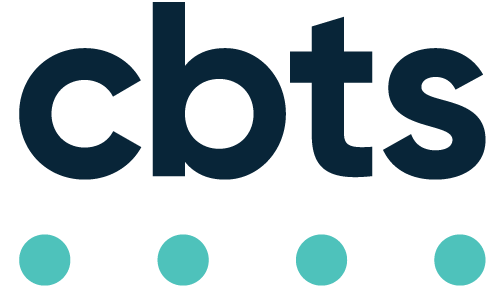

Platinum Sponsors



Exhibitor Sponsors
